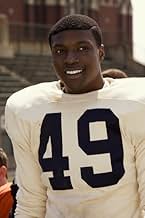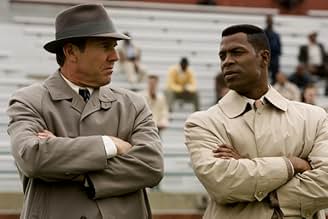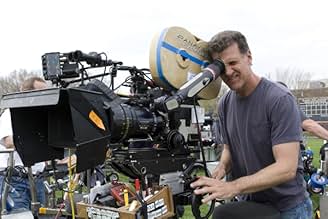VALUTAZIONE IMDb
7,2/10
23.284
LA TUA VALUTAZIONE
Segui la vita dell'eroe del football universitario Ernie Davis, il primo afroamericano a vincere l'Heisman Trophy.Segui la vita dell'eroe del football universitario Ernie Davis, il primo afroamericano a vincere l'Heisman Trophy.Segui la vita dell'eroe del football universitario Ernie Davis, il primo afroamericano a vincere l'Heisman Trophy.
- Premi
- 1 vittoria e 3 candidature totali
Aunjanue Ellis-Taylor
- Marie Davis
- (as Aunjanue Ellis)
Recensioni in evidenza
Sending off the film in a monologue which encapsulates his entire story, lead character Ernie Davis (Rob Brown) concedes to the fact that he doesn't quite know how to end his story; it's a desirable lack of focus for a man who doesn't necessarily want to tell a structurally sound story, but a powerful and important message about his struggle instead. Yet this sometimes off balanced narrative unwittingly carries through onto this, the big screen adaptation of young Ernie Davis' story, and the movie as a result is worse off, no matter how faithful it may adhere to the source material which borrows largely from the main character's real life biography. The Express for all intents and purposes retains the important elements of Davis' short but inspiring tale, backing up the movie's hard hitting themes with solid heart, soul and passion; yet lumbered with a force-fed implementation that sacrifices the stories emotional integrity for mawkish melodrama, the feature too often looses its footing when it really counts. Nevertheless, with some fitting performances, stark photography and an endlessly inspiring story of unity, social injustice and change, The Express still manages to overcome its weaker moments to make a greater whole.
Told through the eyes of up and coming black American football sensation Ernie Davis, The Express delivers a two punch game that fights on two fields which turn out to be one in the same. Ostensibly the feature is about Ernie's battle to the top of the game back in its earliest days when to be black was looked upon as something of a weakness or automatic disqualification from being taken seriously. On this purely face value level, the movie does well; it has the building structure and bubbling tension needed to create the necessary highs and lows of a typical, engrossing sports movie. Watching Ernie is like watching a legend, and that's exactly what it should be like. Sure enough the man is more or less untouchable in the movie's first two thirds, but showing his weaknesses on field would be superfluous at best. Instead the script leaves much of Davis' conflict and hardship to be faced off the pitch, even when he's playing on it. At its heart, The Express is a moral tale of people coming together and letting parts of themselves go that maybe they hadn't thought through quite thoroughly enough; at its core, The Express is about racial discrimination. Counterbalancing the much more visceral aspects of the feature with this emotive, heart felt drama; the movie achieves both a sense of wonder and relevancy that still rings true to this day.
Despite the script's well intentioned spirit however, all does not go well when it is finally given transition to the big screen. Director Gary Fleder and composer Mark Isham too often inject the feature with an overbearing, sometimes sickening level of sugar coated melodrama. From the sweeping strings of Isham's sentimentally ridden compositions to Fleder's insistence on emphasising start contrasts between the stories dark and light moments, The Express sometimes boils down to mere caricature that belittles the ideas that the script is trying to get across. Thankfully though, all is not lost in either of their abilities; Isham does far better when scoring for the movie's faster moving segments and Fleder gets some hard hitting and poignant performances out of his main cast. The movie's central performances from Rob Brown and Dennis Quaid are nothing of any remarkable significance, but they serve their purposes well and do justice to the characters that they are playing; sure enough Quaid can be his withdrawn, wooden self from time to time, but his presence is a fine mixture of warm and cold, enough to make the relationship between the two main characters compelling to watch develop.
As engrossing as this can all be though, it's oft hard to swallow some of what the movie tries so hard to press upon you; it's a film that tries to raise questions whilst simultaneously answering without being too cynical, and for the most part, does that well enough, even if it is all a little too dependant on sucrose for its own good. So while watching The Express can feel a little like getting force-fed an over-sized, over-iced and over-baked cake to chow down on for two hours, the end result is at least in itself, satisfying. Telling a story of perseverance against the most uncomfortable of challenges whilst at the same time incorporating themes of friendship, family and even a little football into the mix, The Express is a movie that is more about the substance beneath rather than the sometimes troublesome crust that encompasses. It takes a long time to get there, and arguably ends far too late, but for anyone looking for an uplifting and inspiring tale of one man changing the course of history forever, then The Express should do well enough.
Told through the eyes of up and coming black American football sensation Ernie Davis, The Express delivers a two punch game that fights on two fields which turn out to be one in the same. Ostensibly the feature is about Ernie's battle to the top of the game back in its earliest days when to be black was looked upon as something of a weakness or automatic disqualification from being taken seriously. On this purely face value level, the movie does well; it has the building structure and bubbling tension needed to create the necessary highs and lows of a typical, engrossing sports movie. Watching Ernie is like watching a legend, and that's exactly what it should be like. Sure enough the man is more or less untouchable in the movie's first two thirds, but showing his weaknesses on field would be superfluous at best. Instead the script leaves much of Davis' conflict and hardship to be faced off the pitch, even when he's playing on it. At its heart, The Express is a moral tale of people coming together and letting parts of themselves go that maybe they hadn't thought through quite thoroughly enough; at its core, The Express is about racial discrimination. Counterbalancing the much more visceral aspects of the feature with this emotive, heart felt drama; the movie achieves both a sense of wonder and relevancy that still rings true to this day.
Despite the script's well intentioned spirit however, all does not go well when it is finally given transition to the big screen. Director Gary Fleder and composer Mark Isham too often inject the feature with an overbearing, sometimes sickening level of sugar coated melodrama. From the sweeping strings of Isham's sentimentally ridden compositions to Fleder's insistence on emphasising start contrasts between the stories dark and light moments, The Express sometimes boils down to mere caricature that belittles the ideas that the script is trying to get across. Thankfully though, all is not lost in either of their abilities; Isham does far better when scoring for the movie's faster moving segments and Fleder gets some hard hitting and poignant performances out of his main cast. The movie's central performances from Rob Brown and Dennis Quaid are nothing of any remarkable significance, but they serve their purposes well and do justice to the characters that they are playing; sure enough Quaid can be his withdrawn, wooden self from time to time, but his presence is a fine mixture of warm and cold, enough to make the relationship between the two main characters compelling to watch develop.
As engrossing as this can all be though, it's oft hard to swallow some of what the movie tries so hard to press upon you; it's a film that tries to raise questions whilst simultaneously answering without being too cynical, and for the most part, does that well enough, even if it is all a little too dependant on sucrose for its own good. So while watching The Express can feel a little like getting force-fed an over-sized, over-iced and over-baked cake to chow down on for two hours, the end result is at least in itself, satisfying. Telling a story of perseverance against the most uncomfortable of challenges whilst at the same time incorporating themes of friendship, family and even a little football into the mix, The Express is a movie that is more about the substance beneath rather than the sometimes troublesome crust that encompasses. It takes a long time to get there, and arguably ends far too late, but for anyone looking for an uplifting and inspiring tale of one man changing the course of history forever, then The Express should do well enough.
- A review by Jamie Robert Ward (http://www.invocus.net)
This was a very well acted movie. Dennis Quaid did a great job of playing the coach and Rob Brown was the perfect choice for Ernie Davis. The ratings this movie has received so far are not in line with the quality of this film. This movie in no way presented a political point of view. The only thing political was what happened in real life. This was the recognition given to Ernie by the president of the time. (which was JFK) Other than this movie was more inspirational. It showed the character of Ernie Davis and the faith he had in his own abilities, his coach, family and his God. Ernie Davis has reshaped College sports. Due to his ability to cope with hatred and racism in a positive way. The game of college sports has vastly become more professional. The talent of teams today is far greater than the past. Ernie opened the door foe all races in sports; thus increasing the abilities of the teams. I highly recommend this film.
Enjoyed the movie but for purist there were many factual inaccuracies. Syracuse did not play Boston College in 1959. The West Virginia game in which WV and their fans are portrayed as very racist was played in Syracuse not Morganton. In the Texas game of that year the score was never 15-14. There are others but that suffices. When a description is "based" on a true story it means not everything is necessarily true. Remember that as one videographer told me, "we are artists and entertainers and not historians!"
It's a shame that this film went to such trouble to get details like uniforms and campus settings accurate and then played so loosely with the facts. A prime example is when the 1959 Syracuse team won the national championship by defeating Texas in the Cotton Bowl, an event portrayed as if the Orange had never experienced such a rabid segregationist setting. In fact, they had played in the same Cotton Bowl three years earlier, losing to TCU 28-27. And for that game they had Jim Brown, an African-American, on the team so the problems they encountered (segregated hotels etc.) would not have been unexpected nor unprepared for. The actual game is totally mixed up, that is to say the first SU TD was the 87-yard Schwedes to Davis pass, not the last, as shown. And, as Schwartzwalder was always quick to point out, Texas was never within fewer than two scores of overtaking the Orange -- not as close as 15-14 as shown in the film. One could go on and on, but to someone unfamiliar with the facts, it is an inspiring story that should complement other films about the civil rights era.
Loosely based on the life of the first black football player to win the Heisman Trophy, this follows a chap named Ernie Davis -- a name most viewers are unlikely to be familiar with -- throughout his school years. When he reaches Syracuse College, he finds he is one of two black players on his team. His coach is played by Dennis Quaid. The period was just far enough back in time that there were very few black football players, and in some states, blacks could not stay in the same hotels or attend social functions with whites. All of this is dealt with in a forthright manner, although some facts have been slightly altered to punch home the drama of the era. Quaid's coach is a gruff old man with a heart of gold, a role Quaid likely will be playing more and more often as he ages. You may not recognize many of the actors in this, but they are uniformly excellent. Worth a watch, even if you dislike football.
Lo sapevi?
- QuizChadwick Boseman's feature film debut.
- BlooperIn the movie, Texas leads Syracuse 15-14 in the 1960 Cotton Bowl. In real life, the game was never that close in the second half. Syracuse was up 23-6 when Texas scored their second and last touchdown with 7:39 remaining in the game. Texas was not in a position to tie Syracuse even with a touchdown and 2-point conversion.
- Citazioni
Texas Longhorn player: I'm gonna kick your black ass back to Africa boy!
Jack Buckley: Oh yeah? Too bad I'm from Philly.
- ConnessioniFeatured in HBO First Look: The Express (2008)
- Colonne sonoreChoo Choo Ch' Boogie
Written by Vaughn Horton, Denver Darling, Milton Gabler
Performed by Louis Jordan & The Tympany Five (as Louis Jordan & His Tympani Five)
Courtesy of Geffen Records
Under license from Universal Music Enterprises
I più visti
Accedi per valutare e creare un elenco di titoli salvati per ottenere consigli personalizzati
Dettagli
- Data di uscita
- Paesi di origine
- Lingua
- Celebre anche come
- The Express: The Ernie Davis Story
- Luoghi delle riprese
- Chicago, Illinois, Stati Uniti(Lane Tech High School)
- Aziende produttrici
- Vedi altri crediti dell’azienda su IMDbPro
Botteghino
- Budget
- 40.000.000 USD (previsto)
- Lordo Stati Uniti e Canada
- 9.793.406 USD
- Fine settimana di apertura Stati Uniti e Canada
- 4.562.675 USD
- 12 ott 2008
- Lordo in tutto il mondo
- 9.808.124 USD
- Tempo di esecuzione2 ore 10 minuti
- Colore
- Mix di suoni
- Proporzioni
- 2.35 : 1
Contribuisci a questa pagina
Suggerisci una modifica o aggiungi i contenuti mancanti









































